In this article:
Hair oil and hair tonics are very commonly used products in hair care, but do you know how to use them and how different they are from each another?
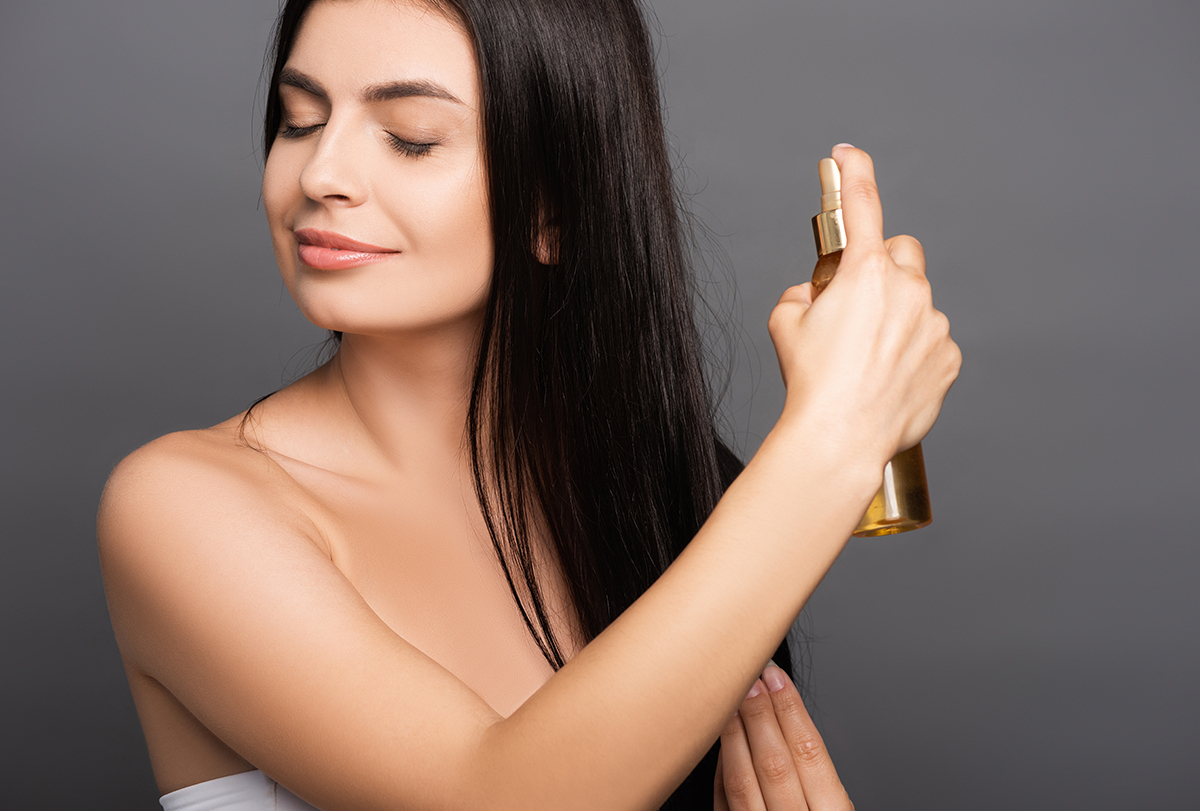
People are often unaware of the important points that they should know before investing in such products. Read on to find out about the differences between hair oils and tonics and their roles in a hair care routine.
Difference Between Hair Oils and Tonics
| Hair Oils | Hair Tonics |
|---|---|
| Oils are obtained naturally from seeds and plant parts and hardly contain any chemicals. | Tonics are extracted from herbal plants that produce secondary metabolites. |
| They aren't generally used for hairstyling. | They are great for grooming purposes and hair styling. |
| They can make the hair a bit heavy. | They are very lightweight on hair. |
| They need to be rinsed off after shampooing. | They do not always require rinsing off with water. |
| They can make the hair greasy if you have naturally oily hair. | They do not make the hair greasy or oily. |
| They are good for dry hair as they lubricate the scalp. | They are great for dry hair and keep dandruff in control. |
What Is a Hair Tonic?
A hair tonic is a very widely used product around the world because of its hair styling and grooming benefits. The best part about using a hair tonic is that it is very light on your hair, so it will not weigh it down. It will also help you get rid of buildup from chemical treatments that may be harmful to your hair.
Tonics are generally used to add shine to the hair and make them look glossy, giving it a very healthy appearance. Not only this, but using a hair tonic helps keep your hairstyle in place throughout the day.
A hair tonic will also provide moisturization to your hair to prevent dryness. This is why it is good for reducing split ends and premature hair breakage.
There are some tonics that are beneficial for controlling dandruff as well. (1)
What Is a Hair Oil?
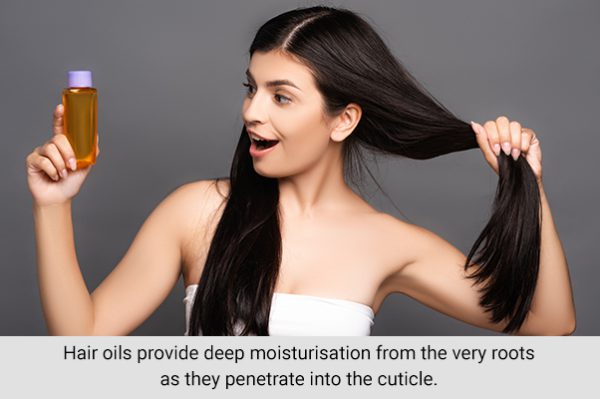
Hair oils come with a set of benefits and uses. Because of their long history, they are more common than hair tonics, are made of natural ingredients, and do not contain many chemicals, making them great for hair care. They deeply moisturize your hair when massaged gently into the hair roots and scalp.
While hair tonics coat your hair strands for shine and protection, hair oils provide deep moisturization to the very roots as they penetrate into the cuticle. They also lubricate the scalp, keeping away dryness and tangles. They protect the hair from heat damage and control frizz by ensuring your hair always has a smooth texture. (2)
Benefits of Hair Tonics
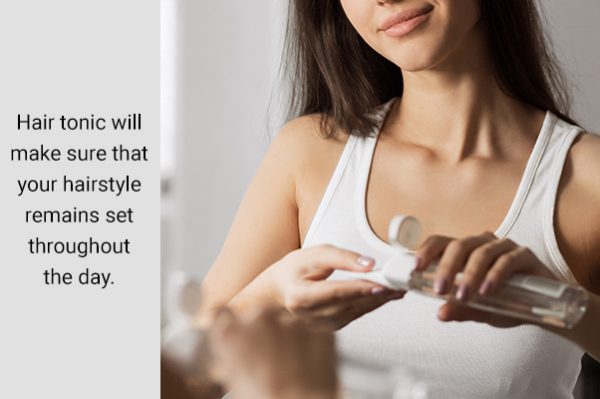
Here are the benefits of using hair tonics: (3)(4)(1)
- Hair tonics ensure that your hairstyle remains set throughout the day.
- Applying a hair tonic to your hair before styling makes it very easy for you to get your desired results.
- Hair tonics moisturize your hair and prevent dandruff, split ends, or hair dryness.
- Massaging your hair with a hair tonic causes increased blood circulation to the scalp, which is why it can be good for hair growth.
- Hair tonics will give your hair a healthy and shiny appearance.
Disadvantages of Hair Tonics
Using too much hair tonic can have drawbacks. Some of them are as follows: (5)
- Some hair tonics may not be appropriate for daily usage and some require rinsing with water after application. Properly read the instructions on the product label before using them.
- Use only a small amount of tonic; if used in excess, hair tonics can be harmful to your hair health.
- Some tonics are medicinal and should only be used after learning the proper dosage from a doctor.
Benefits of Hair Oil
Here are the benefits of oiling your hair: (6)
- Oil protects your hair from pollutants and harmful buildup that may arise from using hair products.
- If you oil your hair regularly, your hair will remain hydrated and be kept away from dryness.
- The oil will protect your hair from damage due to chemical treatments and other kinds of hairstyling treatments.
- Using oil on your hair reduces hair loss and exfoliates the scalp.
- When you oil your hair regularly, the lost natural lipids in the hair will be replaced by the fatty acids in the hair oil.
- Hair oils keep the hair smooth and frizz-free.
- Oiling nourishes the hair shaft and promotes healthy hair.
Disadvantages of Hair Oils
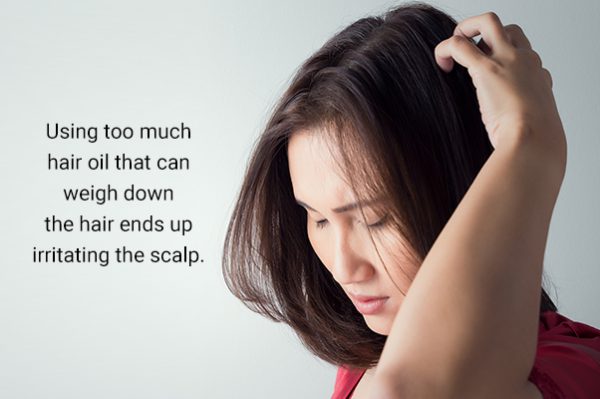
Oiling your hair too much can have drawbacks. Some of them are: (7)
- Using too much hair oil can weigh down the hair and irritate the scalp.
- Allergies to a certain oil can result in inflammation of the scalp, thereby damaging the hair.
- Using hair oils on naturally greasy or oily hair may cause excessive greasiness.
Can Hair Tonics and Oils Be Used Together?
If you require both the moisturizing property of hair oils and the hair-strengthening property of hair tonics and using them both does not weigh down your hair, then you can apply both oils and tonics together.
Start by learning about your hair type and requirements. If you have thin and fine hair, oiling is a better option. But if your scalp tends to be itchy and flaky, then prioritize hair tonics.
Why Are Oils Better Than Tonics in the Long Run?
Oils soothe your scalp, hydrate your hair, provide shine to it, and make it healthy looking. (6) The results you get from hair oil application are generally longer lasting than the ones you may get from using hair tonics.
Simply because of their strengthening and long-lasting hair benefits, oils make a better choice than tonics for your hair.
Who Can Use Hair Oils?
One good thing about hair oils is that they can be used by anyone with any type of hair. From straight to curly, and oily to dry, all hair types tend to benefit from a good old oil massage.
Nowadays, there are oil formulations and styling products available that are light on your hair and do not weigh it down. This means those who have greasy hair can also get the benefits without having to suffer from weighed-down hair. (2)
Can Hair Tonics Be Used Every Day?
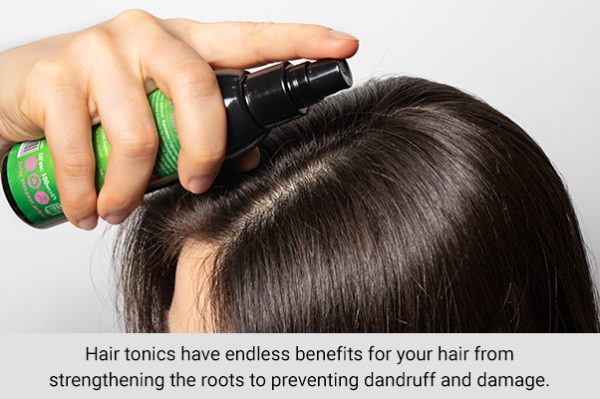
Hair tonics have endless benefits for your hair, from strengthening the hair roots to preventing dandruff and damage. You can use hair tonics every day on your scalp for a light massage; just use a small amount every day and do not put it on excessively.
Hair Oils Versus Hair Tonics: What Should You Choose?
The decision of choosing either a hair oil or a hair tonic depends upon your hair type and the issues you are having.
If you have thick and dry hair, hair oils are always a better option to keep it hydrated and soothe the scalp. But if you have a flaky and itchy scalp, a hair tonic is a better option because it will stimulate blood circulation in the hair follicles and hydrate the hair and it’s not going to weigh it down.
If you have curly hair, prefer hair oils because they provide deep conditioning when done right.
At-Home Hair Tonic for Shiny Hair
Onion and ginger are both very good for your hair because they promote blood circulation to the scalp. So, using a hair tonic made from these ingredients is a great way to make your hair shiny and healthy.
It is very simple to do. Press ginger and onions in a juicer and mix the juices. Apply the mixture to your scalp. Leave it on for half an hour and then rinse it off with water. Doing this every now and then can lead to good results. (8)(9)
At-Home Hair Tonic for Dandruff Control
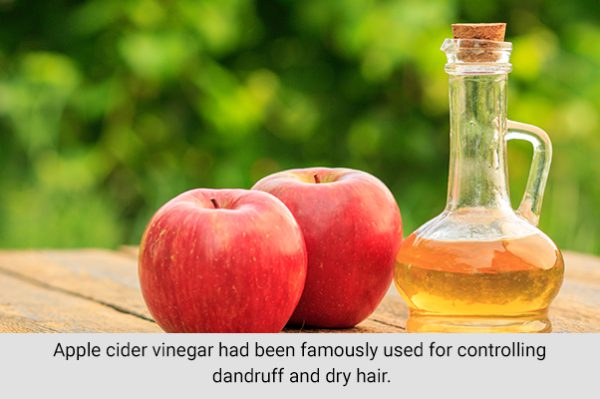
Apple cider vinegar has been famously used for controlling dandruff and dry hair. Applying an apple cider tonic to your hair is a good practice.
Simply mix apple cider vinegar with your hair oil and apply it to your scalp. Leave it on overnight, and the next morning, rinse it off before shampooing. Doing this once weekly is enough to see results. (9)
How Is a Hair Tonic Applied?
After you’re done shampooing your hair, add a few drops of apple cider vinegar to a mug of water and use the mixture to rinse your hair one final time. Whenever you shampoo your hair, make sure you do not use too much of the product and rinse it off completely before stepping out of the shower.
What Are the Best Oils for the Hair?
The most commonly used hair oils include:
- Coconut oil
- Almond oil
- Sesame oil
- Amla oil
- Argan oil
- Jaborandi oil
Final Word
Different hair problems require different types of hair care products to solve them. Also, your hair type will dictate what type of product will work on it best.
Hair oils can be used to protect and hydrate your hair, while tonics are great for stimulating your scalp and promoting shiny and healthy hair. Choose what products work for you best.
- Was this article helpful?
- YES, THANKS!NOT REALLY


